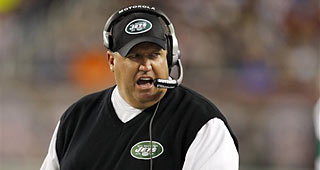In 2009, the New York Jets hired the defensive coordinator of the Baltimore Ravens to become their head coach and drafted a promising young quarterback from the USC. The coach, Rex Ryan, built and coached a team that prided itself on tough defense and efficient offense. The quarterback, Mark Sanchez, played well as a rookie and looked to have a promising future as the leader of the Jets.
That year, the Jets would finish 9-7 during the regular season, good enough to earn them a wildcard spot in the playoffs. From there, the Jets relied on its unrelenting defensive play and power running game to carry the team through the postseason. The strategy worked, as Ryan’s club held the both the Bengals and Chargers to 14 points in the Wild Card and Divisional round, respectively.
The Jets finally met there match in the AFC Championship game in which Peyton Manning and the Colts proved to be too much to handle. Still, there was ample optimism for the Jets following the season and high expectations for both the team and its young quarterback in 2010.
The next season, Sanchez’s numbers improved. His interception total dropped from 20 to 13 and he threw five more touchdown passes than the year before. He and the even stingier Jets defense led the team back to the AFC Championship game after finishing 11-5 in the regular season. Again, New York failed to advance to the Super Bowl as they were thwarted by the Pittsburgh Steelers this time.
The following offseason, New York parted ways with veterans Damien Woody, Kris Jenkins and Jason Taylor. The Jets, who had been so strong up front on both sides of the ball, now had holes to fill. Although the team brought in young talent to replace it departed players, New York was never quite the same in the trenches.
The Jets’ real problem, however, began to reveal itself during the season. After showing so much promise during his first two seasons, Sanchez was no longer progressing as a quarterback. Instead, his decision-making ability seemed to be regressing. During the 2011 season, Sanchez threw five more interceptions than in 2010 and lost seven more fumbles. He was also sacked a whopping 39 times, many of which can be attributed to poor choices on his own part rather than shoddy protection from his offensive line.
After finishing at a very mediocre 8-8 during the regular season and missing the playoffs entirely, the crushing weight of the New York media and fan base began to come down on the team and especially on its quarterback. Football analysts and sports journalists began to question whether Sanchez had the intangible attributes that are so essential to a quarterback’s success.
Then, just when it seemed things couldn’t get much worse for the Jets, the 2012 offseason rolled around. New York failed to upgrade its roster and instead chose to rely on many of the same players from their 2009 and 2010 campaigns who were now past their prime.
In addition to failing to improve the roster, the Jets also decided to fill their open offensive coordinator position with Tony Sparano, formerly the head coach of the Miami Dolphins. It was a decision that made little sense, considering the Dolphins had one of the most anemic and bland offenses in the league when Sparano was holding the reins.
The dagger, however, came in the form of a trade. On March 21st of the 2012 offseason, the Jets acquired Tim Tebow from the Denver Broncos. What followed was a media storm that would create endless controversy and eventually drag the entire organization into chaos.
For all of Tebow's positive attributes, bringing him onto a football team when you have no intention of starting him immediately erases all of those positive things.
As soon as he stepped foot in the Jets’ locker room, Tebow was nothing more than a distraction. Bringing in a new, high-profile player to back-up a struggling young quarterback would have been a bad situation anywhere, but in New York, where it is impossible to escape the spotlight, the negative effects were magnified.
The Jets started out the 2012 season at 2-1 before dropping their next five of six. Sanchez was playing terribly. He wasn’t throwing touchdown passes and instead developed a habit of turning the ball over whether it was by interception or fumble. He looked uptight and uncomfortable in interviews, especially when asked about Tebow.
When it was all said and done, Sanchez finished the season with 13 touchdowns, 18 interceptions, 8 lost fumbles, and a quarterback rating of 66.9. The quarterback’s inability to mentally handle the weight of the New York media and to steadily improve on the field was a flaw the Jets could not have recovered from. The team finished with a 6-10 record and missed the playoffs for the second straight year.
Now, the Jets have added another unstable quarterback through the draft and traded away their best defensive player rather than re-signing him. All of the credibility that the Ryan and Sanchez built during the 2009 and 2010 seasons has vanished as quickly as it arrive. The entire organization has become dysfunctional and unless changes are made quickly, Jets fans should prepare for another rough season.


